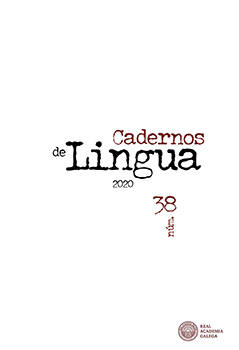Linguistic change in youth: moments and factors
DOI:
https://doi.org/10.32766/cdl.38.753Keywords:
linguistic change, biographical narrative, young people, linguistic policyAbstract
This paper explores, using semi-structured interviews, the biographical narratives of seventeen young Galician men and women in search of linguistic changes (Pujolar [et al.] 2010) aiming to understand which are the life moments and factors that favour changes in linguistic uses, so that normalizing actions and linguistic policies planification could be improved. The analysis of the life trajectories of the interviewees, grouped by initial language, is done in a systematic way, paying attention to family and geographical context, education, entering the world of work and linguistic attitudes. In the final conclusions, life moments and factors that seem to favour linguistic changes (if these take place) are presented, including some aspects to which normalizing actions and linguistic policies should pay more attention.
Downloads
References
Atkinson, Rowland e John Flint (2004): “Snowball sampling”, en Michael S. Lewis-Beck, Alan Bryman e Tim Futing Liao (eds.), The SAGE Encyclopaedia of Social Science Research Methods. Thousand Oaks, Calif.: Sage, 1044-1045.
Brown, Penelope e Stephen Levinson (1987): Politeness. Some universals in language use. Cambridge: University Press.
Christison, Mary Ann (2010): “Negotiating multiple language identities”, en David Nunan e Julie Choi (eds.), Language and culture. Reflective narratives and the emergence of identity. New York: Routledge, 74-81.
De Fina, Anna (2003): Identity in narrative: a study of immigrant discourse. Amsterdam: John Benjamins.
Goffman, Erving (1990): The presentation of self in everyday life. London: Penguin Books.
Milroy, Lesley (1980): Language and social networks. Oxford: Basil Blackwell.
O’Rourke, Bernadette e Fernando Ramallo (2013): “Competing ideologies of linguistic authority amongst new speakers in contemporary Galicia”, Language in Society 42(3), 287-305.
O’Rourke, Bernadette e Fernando Ramallo (2014): “Perfiles de neohablantes de gallego”, Digithum: A relational perspective on culture and society 16, 98-105.
O’Rourke, Bernadette e Fernando Ramallo (2015): “Neofalantes as an active minority: understanding language practices and motivations for change amongst new speakers of Galician”, International Journal of the Sociology of Language 231, 147-165.
Padín Álvarez, Paulo (2017): Neofalantes na era digital. Barcelona: Universitat Oberta de Catalunya. [Traballo de Fin de Mestrado].
Pujolar, Joan, Isaac González e Roger Martínez (2010): “Les mudes lingüístiques dels joves catalans”, Llengua i Ús 48, 65-75.
Ramallo, Fernando (2018): “Linguistic diversity in Spain”, en Wendy Ayres-Bennett e Janice Carruthers (eds.), Manual of Romance Sociolinguistics. Berlin: De Gruyter.


